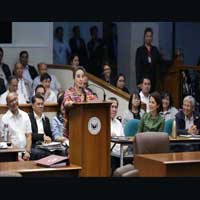CONVERGENCE PROGRAM TO STIMULATE BAMBOO DEVELOPMENT REVEALED
The Department of Environment and Natural Resources (DENR) is partnering with the Climate Change Commission and other government agencies and stakeholders to ensure the success of a government program designed to promote bamboo as an effective tool for climate change mitigation and poverty alleviation.
Speaking at the recent National Symposium and Exhibit on Bamboo held in Pasay City, DENR Secretary Gina Lopez said the government will make sure local communities will directly benefit from the livelihood component of the so-called "Bamboo Program" of the government.
Lopez said the government plans to invest heavily in the development of bamboo, which not only has proven high carbon sequestration capacity to support climate mitigation, but also could sustainably support local resource-based economies.
"We input money there to grow the bamboos but the result of that creates an economic stimulus and then you keep on growing the money until people's lives come up in time. It has to be impact- oriented and results-geared," Lopez explained.
"In the Bamboo Program we do adaptation because that's protection, and then mitigation because it absorbs carbon and then we do inclusive growth," she added.
Studies have shown that compared to some trees, bamboo has the capacity to sequester 400 percent more carbon per unit area.
The DENR earlier said it plans to establish one million hectares of bamboo plantation in critical watershed areas and other sites covered by the Enhanced National Greening Program within the next six years.
Lopez expressed high hopes on the success of the Bamboo Program which, she said, could help the country access the Green Climate Fund, a financial mechanism under the Paris Agreement on Climate Change.
"We need to make this work because if it works, then the country can be a recipient of a lot of money," Lopez pointed out.
Under the Paris Agreement, developed countries have pledged to raise US$1 billion a year by 2020 to help developing countries in their adaptation efforts.
The National Symposium and Exhibit on Bamboo has brought together 300 experts, policymakers and key stakeholders in the bamboo sector to discuss the role of bamboo in climate mitigation and sustainable development.
Secretary Emmanuel De Guzman, the CCC vice chair and executive director, described the event as a "transformative endeavor between the two government agencies to bring about change in our people's lives at the grassroots and to pave the way for greener, healthier and more sustainable future for our country."
"Today's event marks the new milestone for us climate advocates to collaborate efforts and strategies to translate the known benefits of bamboo to life-changing initiatives on the ground," De Guzman said.
Also present during the event were Undersecretary Zenaida Maglaya of the Department of Trade and Industry and Ilocos Sur Rep. Deogracias Savellano, who is the principal author of a bill calling for the creation of the Philippine Bamboo Industry Development Program.
The bill also seeks to declare September as Bamboo Month following the annual celebration of World Bamboo Day on September 18.
The bamboo symposium provided a venue for participants to discuss bamboo as an alternative resource materials and for the government to encourage investors to look into bamboo by-products and their market potential, and present its policy on bamboo.
The exhibit, on the other hand, featured bamboo-made products like bicycle, flute, tea, and clothing materials. Exhibitors included the Philippine Bamboo Foundation, Bamboo Tisane, Sangay Architects, King Flute and Kawayan 7, a musical group which uses musical instruments made from bamboo. ###
- Details
- Parent Category: News & Events
- Category: Press Releases
- Hits: 1548



